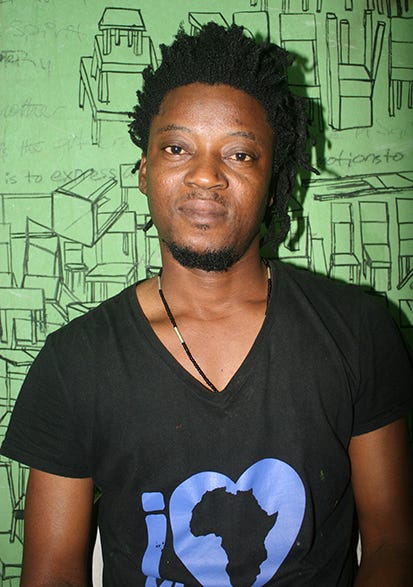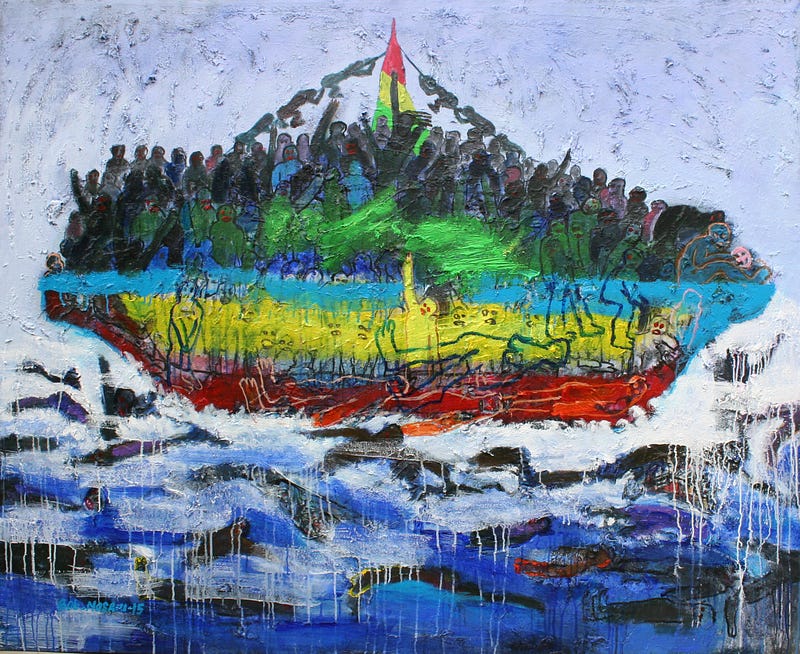August
Inmates...Iweka’s approach to ending corruption
By
Prisca Sam-Duru
Corruption,
greed and unpatriotism will make perfect storyline any time, any day
in any African narrative, for as long as her leaders remain
insensitive to the need for total transformation of the continent.
In
Chidubem Iweka’s latest offering to literary firmament; a 64-page
drama titled, August
Inmates,the
above issues and more, echo the priority of changing the African
narrative by no other than Africans themselves.
Published by Krafts Books, Ibadan, Oyo State, August Inmates is an exquisite book that exposes the levels of corruption in an imaginary African country as well as how to deal with the perpetrators of this unholy act.
Published by Krafts Books, Ibadan, Oyo State, August Inmates is an exquisite book that exposes the levels of corruption in an imaginary African country as well as how to deal with the perpetrators of this unholy act.
 Written
as an Exposé of how men who are entrusted with the task of
transforming the nation, end up leaving it comatose, Iweka's play is
a conscious and concerted effort to bring about a revolutionary
change in politics. It also brings to the fore, what corruption has
done to African countries such as Nigeria, how bad eggs in the police
force either connive with some top government officials or turn a
blind eye to their excesses, how government spends trillions awarding
contracts which are never executed as well as the menace of what the
author calls Black
on Black apartheid.
Written
as an Exposé of how men who are entrusted with the task of
transforming the nation, end up leaving it comatose, Iweka's play is
a conscious and concerted effort to bring about a revolutionary
change in politics. It also brings to the fore, what corruption has
done to African countries such as Nigeria, how bad eggs in the police
force either connive with some top government officials or turn a
blind eye to their excesses, how government spends trillions awarding
contracts which are never executed as well as the menace of what the
author calls Black
on Black apartheid. And as it is customary for the author, putting his best foot forward, he begins with vivid descriptions of his characters which are well chosen and developed. The description accorded each of the 12 major characters, gives the reader a glimpse of what role he ends up playing. The author maintains his expertise at comparing very contrasting descriptions to drive home his point. This is especially evident in his description of the journalist, Obi Akoli. One wonders why a journalist who is clever and learned
August Inmates by Chidubem Iweka,
published by Kraft Books Limited,
Ibadan, pages 64, 2015.
and also has the ability
to deal with situations confidently, could still appear as shabby as
the author paints him. And worse of it all, is lice infested. Wait
until you savour Akoli’s narrative.August
Inmates,
a stinging satire on African politics, begins and ends in an unknown
holding in an unknown location and for unknown reasons, at least
initially, to the captives who are a mixture of different
personalities and with different designations.
There is an element of suspense as readers/audience get anxious to know about the inmates’ plans to break out. Thought of impending shameless death, makes Chief VIP Okoli, a man of timbre and calibre, reveal startling amounts he looted and stashed away in foreign accounts. Their time together in holding, opens up cans of worms harbouring ills such as promotion of tribalism and poverty in addition to the plights of journalists in spite of the existing Press freedom.
Somehow, towards the tail end of the drama, readers are lured into thinking that August Inmates has the subject of campaign against military junta in Africa but it goes beyond that. This, the author drives home through issuing out death sentences on the inmates without fair trial as well as death sentences for cases that require jail sentences. These are actions typical of dictatorships.
The play criticises Africans who ill treat their fellow blacks the same way foreigners do. These people look down on fellow blacks once they attain a considerable height in life. This is expressed in Act Two Scene one. The different characters of the three major tribes in Nigeria also play out here. Okoli as a core Igbo man, is fearless, takes risks and dabbles into what even an Inspector-General of Police, Adebayo is sore afraid to do. Adebayo is an epitome of cowardice. Fate brings the main acts together with a condemned criminal, Ojemba Ntubari. This creates an opportunity for Ntubari to criticise other inmates, especially, IGP Adebayo who is accused of being the worse armed/pen robber since he, Adebayo robs millions of people while himself, robs only a few people.
At this juncture, the author clearly accuses environment, peers, poverty, necessity and habit as responsible for breeding miscreants who have rendered the polity insecure.
The author makes caricature of situations and individuals as portrayed in the scenes. Obi Akoli acts like a real society watch dog that he is supposed to be as he opens up cans of worms of the corrupt government officials. He poses in the drama as the proverbial wind that exposes the anus of the fowl. A very honest and shrewd journalist who acts as the conscience of the prisoners.
A brilliant blending of humour and serious issues with action, and with a cover page aptly illustrated to suit the title, August Inmates is written with a touch of mastery, borne out of the author’s brilliant imagination. The content also portrays Iweka as a concerned citizen who has spent his life in a country bedevilled with corruption, hoping that some day, someone as patriotic as Obi Akoli will make a difference as a president.
The plot is tightly controlled such that even while spicing up serious situations with humour, there is no room for non-essentials. As appealing and as interesting as the drama is, Chidubem Iweka will never cease to wow the battalion of fans he has earned for himself. And hey, he tricked his readers a great deal, kudos for doing that successfully!
The author’s choice of a simple plot and use of everyday language, makes assimilation easy for all ages.
There is an element of suspense as readers/audience get anxious to know about the inmates’ plans to break out. Thought of impending shameless death, makes Chief VIP Okoli, a man of timbre and calibre, reveal startling amounts he looted and stashed away in foreign accounts. Their time together in holding, opens up cans of worms harbouring ills such as promotion of tribalism and poverty in addition to the plights of journalists in spite of the existing Press freedom.
Somehow, towards the tail end of the drama, readers are lured into thinking that August Inmates has the subject of campaign against military junta in Africa but it goes beyond that. This, the author drives home through issuing out death sentences on the inmates without fair trial as well as death sentences for cases that require jail sentences. These are actions typical of dictatorships.
The play criticises Africans who ill treat their fellow blacks the same way foreigners do. These people look down on fellow blacks once they attain a considerable height in life. This is expressed in Act Two Scene one. The different characters of the three major tribes in Nigeria also play out here. Okoli as a core Igbo man, is fearless, takes risks and dabbles into what even an Inspector-General of Police, Adebayo is sore afraid to do. Adebayo is an epitome of cowardice. Fate brings the main acts together with a condemned criminal, Ojemba Ntubari. This creates an opportunity for Ntubari to criticise other inmates, especially, IGP Adebayo who is accused of being the worse armed/pen robber since he, Adebayo robs millions of people while himself, robs only a few people.
At this juncture, the author clearly accuses environment, peers, poverty, necessity and habit as responsible for breeding miscreants who have rendered the polity insecure.
The author makes caricature of situations and individuals as portrayed in the scenes. Obi Akoli acts like a real society watch dog that he is supposed to be as he opens up cans of worms of the corrupt government officials. He poses in the drama as the proverbial wind that exposes the anus of the fowl. A very honest and shrewd journalist who acts as the conscience of the prisoners.
A brilliant blending of humour and serious issues with action, and with a cover page aptly illustrated to suit the title, August Inmates is written with a touch of mastery, borne out of the author’s brilliant imagination. The content also portrays Iweka as a concerned citizen who has spent his life in a country bedevilled with corruption, hoping that some day, someone as patriotic as Obi Akoli will make a difference as a president.
The plot is tightly controlled such that even while spicing up serious situations with humour, there is no room for non-essentials. As appealing and as interesting as the drama is, Chidubem Iweka will never cease to wow the battalion of fans he has earned for himself. And hey, he tricked his readers a great deal, kudos for doing that successfully!
The author’s choice of a simple plot and use of everyday language, makes assimilation easy for all ages.


